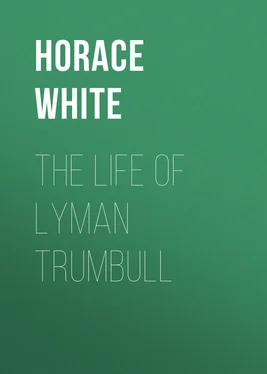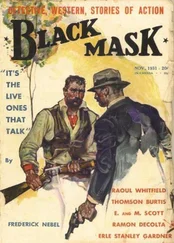Horace White - The Life of Lyman Trumbull
Здесь есть возможность читать онлайн «Horace White - The Life of Lyman Trumbull» — ознакомительный отрывок электронной книги совершенно бесплатно, а после прочтения отрывка купить полную версию. В некоторых случаях можно слушать аудио, скачать через торрент в формате fb2 и присутствует краткое содержание. Жанр: foreign_prose, История, foreign_edu, foreign_antique, на английском языке. Описание произведения, (предисловие) а так же отзывы посетителей доступны на портале библиотеки ЛибКат.
- Название:The Life of Lyman Trumbull
- Автор:
- Жанр:
- Год:неизвестен
- ISBN:нет данных
- Рейтинг книги:5 / 5. Голосов: 1
-
Избранное:Добавить в избранное
- Отзывы:
-
Ваша оценка:
- 100
- 1
- 2
- 3
- 4
- 5
The Life of Lyman Trumbull: краткое содержание, описание и аннотация
Предлагаем к чтению аннотацию, описание, краткое содержание или предисловие (зависит от того, что написал сам автор книги «The Life of Lyman Trumbull»). Если вы не нашли необходимую информацию о книге — напишите в комментариях, мы постараемся отыскать её.
The Life of Lyman Trumbull — читать онлайн ознакомительный отрывок
Ниже представлен текст книги, разбитый по страницам. Система сохранения места последней прочитанной страницы, позволяет с удобством читать онлайн бесплатно книгу «The Life of Lyman Trumbull», без необходимости каждый раз заново искать на чём Вы остановились. Поставьте закладку, и сможете в любой момент перейти на страницу, на которой закончили чтение.
Интервал:
Закладка:
Charles Sumner writes to E. L. Pierce, March 21:
Trumbull is a hero, and more than a match for Douglas. Illinois, in sending him, has done much to make me forget that she sent Douglas. You will read the main speech which is able; but you can hardly appreciate the ready courage and power with which he grappled with his colleague and throttled him. We are all proud of his work.
S. P. Chase, Executive Office, Columbus, Ohio, April 14, 1856, writes:
I have read your speech with great interest. It was timely—exactly at the right moment and its logic and statement are irresistible. How I rejoice that Illinois has sent you to the Senate.
John Johnson, Mount Vernon, Illinois, writes:
I wish I could express the pleasure that I and many other of your friends feel when we remember that we have such a man as yourself in Congress, who loves liberty and truth and is not ashamed or afraid to speak. Let me say that I thank the Ruler of the Universe that we have got such a man into the Senate of the United States.... Your influence will tell on the interests of the nation in years to come.
John H. Bryant, Princeton, writes:
The expectations of those who elected Mr. Trumbull to the Senate have been fully met by his course in that body, those of Democratic antecedents being satisfied and the Whigs very happily disappointed. For Mr. Lincoln the people have great respect, and great confidence in his ability and integrity. Still the feeling here is that you have filled the place at this particular time better than he could have done. 28
At this time Trumbull received a letter from one of the Ohio River counties which, by reason of the singularity of its contents as well as of the subsequent distinction of the writer, merits preservation:
Green B. Raum, Golconda, Pope Co., Feb. 9, '57, wishes Trumbull to find out why he cannot get his pay for taking depositions at the instance of the Secretary of the Interior in a lawsuit involving the freedom of sixty negroes legally manumitted, but still held in slavery in Crawford County, Arkansas. The witnesses whose depositions were taken were living in Pope Co., Ill. Raum advanced $43.25 for witness fees and costs and was engaged one month in the work, for which he charged $300. This was done in May, 1855, but he had never been paid even the amount that he advanced out of his own pocket. 29
In April, 1857, Trumbull received an urgent appeal from Cyrus Aldrich, George A. Nourse, and others in Minnesota asking him to come to that territory and make speeches for one month to help the Republicans carry the convention which had been called to frame a state constitution. He responded to this call and took an active part in the campaign, which resulted favorably to the Republican party.
CHAPTER V
THE LECOMPTON FIGHT
In June, 1856, Lincoln wrote to Trumbull urging him to attend the Republican National Convention which had been called to meet in Philadelphia to nominate candidates for President and Vice-President and suggesting that he labor for the nomination of a conservative man for President. Trumbull went accordingly and coöperated with N. B. Judd, Leonard Swett, William B. Archer, and other delegates from Illinois in the proceedings which led up to the futile nominations of Frémont and Dayton. The only part of these proceedings which interests us now is the fact that Abraham Lincoln, who was not a candidate for any place, received one hundred and ten votes for Vice-President. This result was brought about by Mr. William B. Archer, an Illinois Congressman, who conceived the idea of proposing his name only a short time before the voting began, and secured the coöperation of Mr. Allison, of Pennsylvania, to nominate him. Archer wrote to Lincoln that if this bright idea had occurred to him a little earlier he could have obtained a majority of the convention for him. When the news first reached Lincoln at Urbana, Illinois, where he was attending court, he thought that the one hundred and ten votes were cast for Mr. Lincoln, of Massachusetts.
He wrote to Trumbull on the 27th saying, "It would have been easier for us, I think, had we got McLean" (instead of Frémont), but he was not without high hopes of carrying the state. He was confident of electing Bissell for governor at all events. In August, Lincoln wrote again saying that he had just returned from a speaking tour in Edgar, Coles, and Shelby counties, and that he had found the chief embarrassment in the way of Republican success was the Fillmore ticket. "The great difficulty," he says, "with anti-slavery-extension Fillmore men is that they suppose Fillmore as good as Frémont on that question; and it is a delicate point to argue them out of it, they are so ready to think you are abusing Mr. Fillmore." The Fillmore vote in Illinois was 37,444.
The Republican state ticket, headed by William H. Bissell for governor, was elected, but Buchanan and Breckinridge, the Democratic nominees, received the electoral vote of the state and were successful in the country at large. The defeat of Frémont caused intense disappointment to the Republicans at the time, but it was fortunate for the party and for the country that he was beaten. He was not the man to deal with the grave crisis impending. Disunion was a club already held in reserve to greet any Republican President. Senator Mason, of Virginia, frankly said so to Trumbull in a Senate debate (December 2, 1856), after the election:
Mr. Mason: What I said was this, that if that [Republican] party came into power avowing the purpose that it did avow, it would necessarily result in the dissolution of the Union, whether they desired it or not. It was utterly immaterial who was their President; he might have been a man of straw. I allude to the purposes of the party.
Mr. Trumbull: Why, sir, neither Colonel Frémont nor any other person can be elected President of the United States except in the constitutional mode, and if any individual is elected in the mode prescribed in the Constitution, is that cause for dissolution of the Union? Assuredly not. If it be, the Constitution contains within itself the elements of its own destruction. 30
Four years passed ere Mr. Mason's prediction was put to the test, and the intervening time was mainly occupied by a continuation of the Kansas strife. The prevailing gloom in the Northern mind was reflected in a letter written by Trumbull to Professor J. B. Turner, of Jacksonville, Illinois, dated Alton, October 19, 1857, from which the following is an extract:
Our free institutions are undergoing a fearful trial, nothing less, as I can conceive, than a struggle with those now in power, who are attempting to subvert the very basis upon which they rest. Things are now being done in the name of the Constitution which the framers of that instrument took special pains to guard against, and which they did provide against as plainly as human language could do it. The recent use of the army in Kansas, to say nothing of the complicity of the administration with the frauds and outrages which have been committed in that territory, presents as clear a case of usurpation as could well be imagined. Whether the people can be waked up to the change which their government is undergoing in time to prevent it, is the question. I believe they can. I will not believe that the free people of this great country will quietly suffer their government, established for the protection of life and liberty, to be changed into a slaveholding oligarchy whose chief object is the spread and perpetuation of negro slavery and the degradation of free white labor.
Soon after the inauguration of Buchanan, Robert J. Walker, of Mississippi, was appointed by him governor of Kansas Territory. Walker was a native of Pennsylvania and a man of good repute. He had been Secretary of the Treasury under President Polk, and was the author of the Tariff of 1846. When he arrived in Kansas steps had already been taken by the territorial legislature for electing members of a constitutional convention with a view to admission to the Union as a state. Governor Walker urged the Free State men to participate in this election, promising them fair treatment and an honest count of votes; but they still feared treachery and violence and fraud in the election returns. Moreover, voters were required to take a test oath that they would support the Constitution as framed. As Walker had assured them that the Constitution would be submitted to a vote of the people, they decided to take no part in framing it, but to vote it down when it should be submitted.
Читать дальшеИнтервал:
Закладка:
Похожие книги на «The Life of Lyman Trumbull»
Представляем Вашему вниманию похожие книги на «The Life of Lyman Trumbull» списком для выбора. Мы отобрали схожую по названию и смыслу литературу в надежде предоставить читателям больше вариантов отыскать новые, интересные, ещё непрочитанные произведения.
Обсуждение, отзывы о книге «The Life of Lyman Trumbull» и просто собственные мнения читателей. Оставьте ваши комментарии, напишите, что Вы думаете о произведении, его смысле или главных героях. Укажите что конкретно понравилось, а что нет, и почему Вы так считаете.












